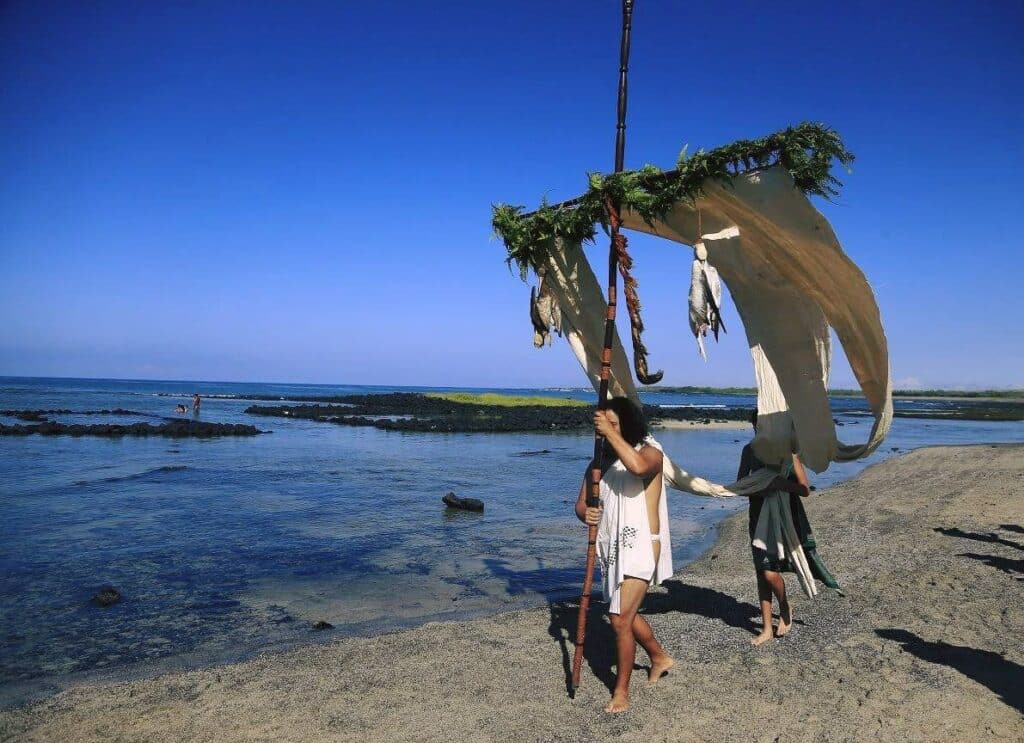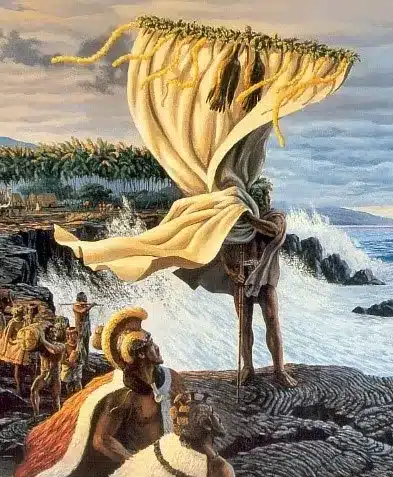As we approach the end of December, the festivities are in full swing. There’s last minute gifts to buy, meals to prepare, and plenty of celebrating to do. It’s all part of the holiday traditions we’ve come to expect from the season. But before the Western World’s customs came to Hawai’i, our islands celebrated Makahiki. And while this festival doesn’t involve placing a start on top of a Christmas tree, the stars do play a very important role in Makahiki.
Meaning “year” in Hawaiian, Makahiki is a season that begins when the Makaliʻi rises in the east at the exact same time that the sun sets in the west. Also known as Messier 45 or the Seven Sisters, the Makaliʻi is a star cluster that can be seen from nearly every corner of the world.

An image of Lono travels a route across the moku (district) in a ritualized survey of the land’s wealth and productivity. Photo courtesy of Hawaii Volcanoes National Park.
In Hawai’i, this phenomenon marks the commencement of the Hawaiian New Year and the Makahiki season. This year, Makaliʻi rose at sunset on November 19th, which means we’re already a month into the New Year! If you gaze up at the sky during Makahiki, you’ll notice Makaliʻi climbs higher and higher above the horizon every night. Other markers of Makahiki include the first Hilo moon (crescent moon) that occurs after the alignment of Makaliʻi and the setting sun, and the arrival of the migratory Kolea birds to Hawai’i.
An Ancient Celebration Revived
In ancient Hawai’i, temple priests on the west side of each island would search the eastern sky for the first Hilo moon, which would mark the beginning of Makahiki. And Makahiki would typically come to a close when the rainy season began in late January or February.
Makahiki is a time for honoring the Hawaiian god Lono, one of the four primary gods recognized in Hawaiʻi as the god of agriculture, fertility, and peace. During Makahiki, war between the aliʻi was forbidden and Lono was celebrated with storytelling, feasting, and hula, as well as competing in sport and games.
Traditionally, Makahiki was a time of pride, reflection, rest, and prayer for the ʻāina (land) and the people. The priests prayed to Lono for the ʻāina’s fertility, while the commoners prayed for the health of themselves and their chiefs, as well as growth and prosperity for their chief’s land.
Makahiki can also refer to the ceremonies and sports observed during this holiday, including holua sledding (sled riding on land), spear throwing, heihei kūkini (racing), mokomoko (boxing), kōnane (a board game resembling chess), hākōkō (a wrestling match similar to sumo), pūhenehene (a skilled-game of deception), and other games and activities to entertain the district’s people. At the end of the celebration, an ali‘i impersonating Lono would take a canoe out to sea and return to shore for a mock battle, in which men threw spears at the ali‘i. If he dodged the spears, divinity would be proved and someone would then touch the ali‘i’s chest with a spear to signify the ritual death of Lono. The ali‘i would then sacrifice a pig in honor of Lono before setting a canoe full of offerings adrift into the expanse of ocean beyond the horizon.
Today, Makahiki also represents a time of rest, rejuvenation, and gratitude to the earth for providing food. The celebration also serves as an opportunity to both strengthen existing bonds and build new relationships. And with the holiday season upon us, we can let Makahiki remind us to make time for family and friends, connect with our community, and welcome new beginnings with an open heart.

Depiction of the Akua Loa. Photo: Herb Kane
Celebrate Makahiki in Volcano
If you’re planning a trip to Hawai’i Island during Makahiki season, we invite you to book your stay at our charming vacation rentals, Tutu’s Place and the Ola’a House, where you can rest, play in Hawai’i Volcanoes National Park, feast on delicious, local food, and share the abundance of the Big Island. Traveling with extended family? Tutu’s Place is across the street from Ola’a House, so book both cottages and bring the whole gang.
We look forward to welcoming you to Volcano and wish you the happiest, healthiest Makahiki season!
